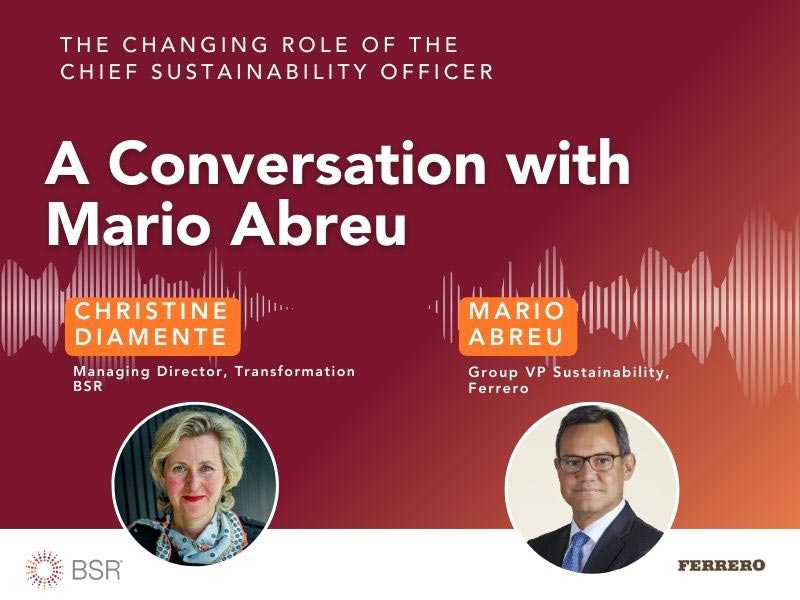
At COP26 in November 2021, the IFRS Foundation announced the creation of the International Sustainability Standards Board (ISSB), a sister board to the International Accounting Standards Board (IASB). This was an exciting development for the investor community, which had expressed a clear need for global and comparable investor-focused sustainability disclosure. Who better to play in this space than the IFRS Foundation? The announcement was particularly timely considering developments such as the SEC’s proposed rule on climate-related disclosures and the EU Sustainability Reporting Standards (ESRS).
With sustainability disclosure standards converging, reporting practitioners and the sustainability community at large have a unique opportunity to shape the outcome of the global sustainability reporting landscape for years to come. We have the power to advocate for increased compliance that not only reduces the reporting burden on companies but also drives concise and decision-useful disclosure.
BSR welcomes and has responded to the ISSB’s two exposure drafts released in March 2022, grounding our comments in 30 years of experience working with member companies. We want to express our congratulations to the ISSB for this milestone and commend their efforts. Please read our General Sustainability-Related Disclosure and Climate-Related Disclosure comment letters for additional details.
BSR would like to see final standards that:
1. Strike a balance between prescriptive disclosures and flexibility
Prescriptive disclosures may lead to more comparable reporting; however, every company’s operating context is different. A degree of flexibility—complemented by clear guidance—would allow disclosures to reflect those differences while ensuring that reporting is not overly burdensome.
BSR suggests developing additional guidance on the location of reported information, such as examples of where and how this information can be found based on jurisdictional requirements, or the ISSB’s perspective on best practice.
2. Align with the jurisdictional definition of “materiality”
We recommend that the ISSB work with jurisdictions to ensure that reporting against one regulator’s materiality definition or set of requirements satisfies those of—or is otherwise accepted by— the requirements of another. Definitions should be consistent, interoperable, and substitutable. Otherwise, they can be interpreted and reported on differently.
BSR proposes that the ISSB clarify that companies may utilize other jurisdictions’ disclosures (e.g., those proposed by EFRAG), which are also intended to satisfy investor needs in the absence of further ISSB standards or where gaps with SASB disclosures remain.
Close alignment between the SEC’s rule on climate-related disclosures and the ISSB Standards is key. BSR encourages the ISSB to maintain close alignment with the TCFD recommendations and include additional topics of disclosure only when deemed necessary to fill significant gaps.
3. Require verifiable climate-related financial disclosures that follow a structured compliance timeline
The ISSB Standards serving as a global baseline for sustainability-related financial reporting implies that jurisdictions will build on them, allowing for the possibility of divergence across jurisdictions. To prevent this, the ISSB should provide guidelines for the adoption of the Standards by regulatory authorities.
Not all jurisdictions will adopt the ISSB Standards, but investors may continue to request ISSB-aligned disclosures as these build on SASB metrics, which will form the basis of the ISSB’s industry-based standards. As such, we recommend that the ISSB continue to provide guidance on how companies can report against the ISSB standards, including on a voluntary basis.
We support the verifiability of climate data as it is especially critical for investors and other stakeholders and features more established collection methodologies.
BSR believes the effective date of both exposure drafts should be the same given that they were created in tandem. We encourage the ISSB to move forward with a common process and compliance timeline for additional standards
4. Include cross-industry requirements required for decision-useful climate-related financial disclosures
We support the breadth of disclosure topics included in the climate exposure draft, including alignment with TCFD. The ISSB should direct companies to additional guidance that would help disclosure of complex topics like scope 3 emissions. The use of climate scenario analysis is an important tool for identifying and assessing climate-related risk and opportunities. As such, companies should only use alternative assessment techniques if they cannot perform a scenario analysis. The ISSB should also remain flexible on disclosure of transition plans as guidance is evolving.
5. Leverage existing industry-based requirements for climate-related disclosures
We strongly support the ISSB’s proposal to include industry-based requirements (Appendix B) that are derived from the SASB standards. Moreover, we support the ISSB’s efforts to develop additional topic-specific standards over time, and we believe that each topic standard should be accompanied by industry-based requirements derived from SASB.
The consolidation of the Value Reporting Foundation (VRF) into the IFRS Foundation is a critical differentiator and brings years of industry-focused sustainability standards setting experience into a well-established financial standard setting entity. We commend the ISSB for its efforts thus far. We encourage them to continue building relationships with voluntary reporting standards and frameworks, to deepen connections between jurisdictional authorities that are developing their own standards, and to take forward future efforts to build on the two ISSB Exposure Drafts.
BSR will continue to engage on this issue, and in ESG reporting more broadly, through our Future of Reporting collaborative initiative. We encourage companies to get involved in the consultation process by showing support for the IFRS Sustainability Reporting Standards in harmonizing the reporting landscape and highlighting ways the ISSB can strengthen the standards for the benefit of all investors.
Topics
Collaborative Initiatives
Let’s talk about how BSR can help you to transform your business and achieve your sustainability goals.








